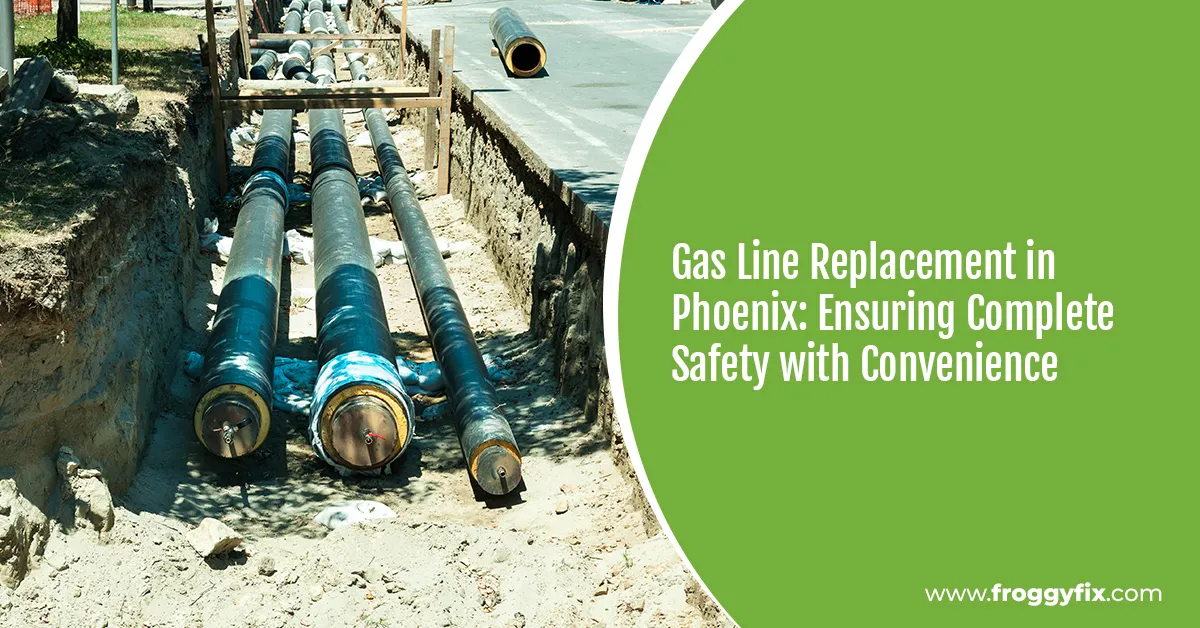

20 02
2024
Gas lines play a crucial role in powering homes and businesses across Phoenix, providing a reliable source of energy for cooking, heating, and more. However, over time, these lines can deteriorate, posing safety hazards to residents and property. In this comprehensive guide, we’ll explore the importance of gas line replacement in Phoenix, addressing common questions and concerns to ensure complete safety and convenience.
Gas line replacement is not just a matter of convenience; it’s a critical safety measure. Over time, natural gas pipelines can deteriorate due to factors such as age, corrosion, and external damage. This deterioration increases the risk of gas leaks, which can lead to fires, explosions, and carbon monoxide poisoning. Therefore, regular inspection and replacement of gas lines are essential to protecting both property and lives.
One of the most common questions homeowners have is how often natural gas lines should be replaced. While there is no one-size-fits-all answer, experts recommend regular inspections and maintenance to assess the condition of gas lines. Factors such as the age of the infrastructure, the material used for the pipes, and environmental conditions can all influence the lifespan of gas lines. In Phoenix, where extreme temperatures and soil conditions are common, regular inspections every 10 to 15 years are advisable to ensure the integrity of the gas distribution system.
Preventive measures can help extend the lifespan of gas lines and reduce the risk of leaks and accidents. Here are some essential tips for protecting your gas line:
Schedule Regular Inspections: Professional inspections by qualified technicians can detect potential issues early and prevent costly repairs or emergencies.
Maintain Proper Ventilation: Ensure adequate ventilation in areas where gas appliances are installed to prevent the buildup of gas fumes and reduce the risk of carbon monoxide poisoning.
Avoid DIY Repairs: Attempting to repair or modify gas lines without proper training and equipment can be extremely dangerous. Always rely on licensed professionals for gas line installation, maintenance, and repairs.
Install Gas Leak Detectors: Gas leak detectors can provide early warnings of potential leaks, allowing you to take prompt action and prevent accidents.
Practice Safe Digging: Before digging in your yard for landscaping or construction projects, call 811 to have underground utility lines marked, including gas lines. This helps prevent accidental damage to gas pipelines during excavation. To learn more about the gas line replacement in Phoenix, check this out https://froggyfix.com/gas-line-replacement-in-phoenix-ensuring-safety-and-efficiency/.
Gas line hazards pose serious risks to both property and personal safety. Some of the potential dangers associated with gas lines include:
Gas Leaks: Leaking gas lines can lead to explosions, fires, and carbon monoxide poisoning. Even small leaks can be hazardous and should be addressed immediately.
Corrosion: Corrosion is a common issue in older gas lines, especially those made of steel or iron. Corroded pipes are prone to leaks and may require replacement to ensure safety.
Physical Damage: Gas lines can be damaged by excavation, construction work, or accidental impacts. It’s essential to be mindful of the location of gas lines and take precautions to avoid damaging them.
Improper Installation: Incorrect installation of gas lines can compromise their integrity and increase the risk of leaks and other safety hazards. Always hire qualified professionals for gas line installation and maintenance.
The type of pipe used for natural gas installations plays a crucial role in ensuring safety and reliability. In Phoenix, as in many other regions, black steel pipe is commonly used for natural gas distribution systems. Black steel pipe is durable, resistant to corrosion, and suitable for high-pressure applications, making it an ideal choice for gas pipelines. Additionally, flexible corrugated stainless-steel tubing (CSST) is gaining popularity for its ease of installation and flexibility, particularly in residential settings.
Moreover, the unique climate conditions in Phoenix, characterized by hot summers and mild winters, can also impact the performance and longevity of gas lines. Extreme temperatures can cause expansion and contraction of the pipes, potentially leading to cracks or leaks over time. Therefore, regular monitoring and maintenance are crucial to address any issues promptly and ensure the safe operation of gas infrastructure throughout the year.
Furthermore, advancements in technology have introduced innovative solutions to enhance the safety and efficiency of gas line replacement in Phoenix. For instance, trenchless methods, such as horizontal directional drilling (HDD) and pipe bursting, offer less disruptive alternatives to traditional excavation techniques. These methods minimize disturbance to the surrounding environment and reduce the time and cost associated with gas line replacement projects.
Additionally, regulatory standards and codes play a significant role in governing gas line installations and replacements in Phoenix. Compliance with industry regulations, such as those set forth by the Arizona Corporation Commission (ACC) and the National Pipeline Safety Regulations (49 CFR Part 192), is essential to ensure that gas infrastructure meets safety requirements and operates reliably.
It’s also important for homeowners to be proactive in monitoring their gas lines for signs of trouble. Symptoms of a potential gas leak include the smell of rotten eggs (an added odorant to natural gas), hissing sounds near gas appliances or pipelines, dead vegetation or discolored soil around the gas line, and unexplained increases in gas bills. If any of these warning signs are observed, it’s crucial to evacuate the premises immediately, avoid using electrical devices or open flames, and contact the gas company and emergency services.
Gas line replacement in Phoenix is a critical aspect of maintaining safety and reliability in the distribution of natural gas. By understanding the importance of regular inspections, preventive maintenance, and compliance with regulations, homeowners can protect their property and loved ones from the hazards associated with deteriorating gas infrastructure. With advancements in technology and a commitment to safety, Phoenix residents can enjoy the convenience of natural gas while ensuring peace of mind knowing that their gas lines are secure and reliable. Hire the best plumbing company to conduct a safe and swift gas line replacement in your house.